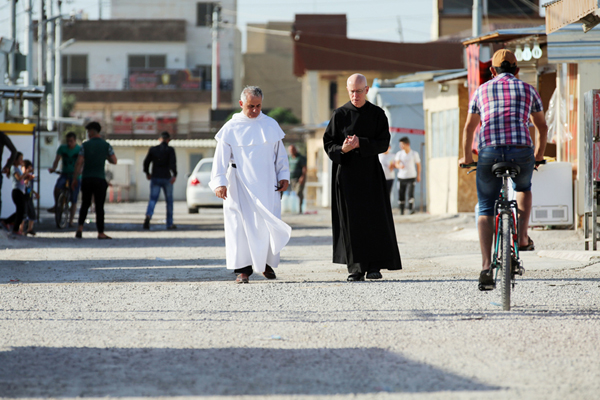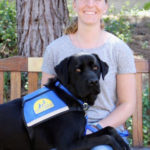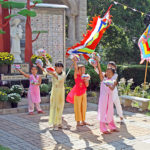By Barb Arland-Fye
The Catholic Messenger
Father Columba Stewart, OSB, recently featured on “60 Minutes” for his dedication to preserving the content of historic and endangered manuscripts worldwide, will present the Chair of Catholic Studies Lecture at St. Ambrose University, Davenport. The March 21 lecture begins at 7 p.m. in the Rogalski Center on campus and is open to the public.

Father Columba Stewart, OSB, right, talks with his Iraqi colleague, Father Nageeb Michael, OP, in a refugee camp in Erbil, Iraq. Fr. Stewart will give a lecture March 21 at St. Ambrose University in Davenport.
Fr. Stewart serves as executive director of the Hill Museum & Manuscript Library (HMML) at St. John’s University in Collegeville, Minn. He accepted the lecture invitation from Micah Kiel, associate professor and chair of the theology department at St. Ambrose University. They met when Kiel was on sabbatical doing research at HMML for his latest book, “Apocalyptic Ecology: The Book of Revelation, the Earth, and the Future.”
“I’ll be speaking about our work ensuring that the contents of pre-modern handwritten books are safe no matter what might happen to them because of war, persecution, emigration and other threats,” Fr. Stewart told The Catholic Messenger. “Almost everything we know about the past is written in manuscripts.”
Last spring he traveled to Iraq where a “60 Minutes” team profiled his work and the mission of HMML to work with librarians, religious leaders, governmental authorities and other not-for-profit organizations to preserve the contents of historic and endangered manuscripts.
“I’ve been to Iraq several times since my first visit in 2009, most recently last May with the team from ‘60 Minutes.’ I knew the situation there before the rise of ISIS, then during their occupation of Mosul and the Christian villages of northern Iraq, and now the aftermath. People I first met in their ancestral homes I saw later in refugee camps, and now many of them have left Iraq looking for peace and freedom in Europe, the U.S., Australia. It’s hard to see an ancient Christian culture uprooted and dispersed.”
He has “traveled extensively throughout the Middle East, Africa, Eastern Europe, the Caucasus, and India, cultivating relationships with communities possessing manuscript collections from the early medieval to early modern periods,” according to the HMML website. He has “overseen the expansion of HMML’s manuscript preservation projects in these regions from one project in Lebanon to projects located in more than a dozen countries. “Since that time, HMML has photographed tens of thousands of manuscripts in many of the world’s most dangerous and difficult-to-reach places.”
“I’ve always been interested in history; my mother was a grade school teacher who instilled in me a love for the past and strong reading habits!” said Fr. Stewart, a graduate of Harvard, Yale and Oxford universities. He has published extensively in his research field of early Christian monasticism. Under his leadership, HMML received the National Medal of Honor from the Institute of Museum and Library Services, the highest award a library can receive in the U.S., the HMML website states.
“What he is doing, I think, fits broadly into a new idea of what is called ‘digital scholarship’ or the ‘digital humanities,’” Kiel said. “Many of the manuscripts they are digitizing, right now, sit on servers waiting to be studied. It is work that will bear fruit for researchers and threatened religious communities for hundred of years, I would imagine.”
Kiel hopes attendees see “the interesting connection between the ancient idea of Benedictine values and the modern world. Also apparent will be how the Catholic Intellectual Tradition is not stuck in the past, but should be the thing that puts us on the cutting edge. I expect also that attendees will learn some things about what life is like for threatened communities in places like Iraq, Syria, etc.”
Fr. Stewart said the most rewarding aspect of his work is to know “that the voices of the past will continue to speak as scholars study the manuscripts we photograph.” He hopes his audience at the St. Ambrose University lecture “goes home with a broader sense of the Christian world, as well as an appreciation of how often Christians and Muslims have lived well together, and must learn again how to do so.”











